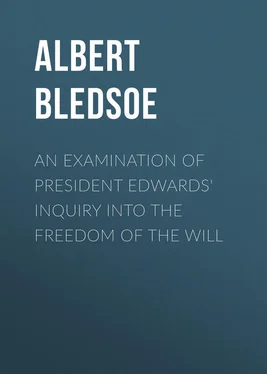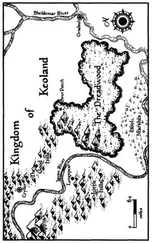Albert Bledsoe - An Examination of President Edwards' Inquiry into the Freedom of the Will
Здесь есть возможность читать онлайн «Albert Bledsoe - An Examination of President Edwards' Inquiry into the Freedom of the Will» — ознакомительный отрывок электронной книги совершенно бесплатно, а после прочтения отрывка купить полную версию. В некоторых случаях можно слушать аудио, скачать через торрент в формате fb2 и присутствует краткое содержание. ISBN: , Издательство: Иностранный паблик, Жанр: foreign_antique, foreign_prose, на английском языке. Описание произведения, (предисловие) а так же отзывы посетителей доступны на портале библиотеки ЛибКат.
- Название:An Examination of President Edwards' Inquiry into the Freedom of the Will
- Автор:
- Издательство:Иностранный паблик
- Жанр:
- Год:неизвестен
- ISBN:http://www.gutenberg.org/ebooks/35839
- Рейтинг книги:4 / 5. Голосов: 1
-
Избранное:Добавить в избранное
- Отзывы:
-
Ваша оценка:
- 80
- 1
- 2
- 3
- 4
- 5
An Examination of President Edwards' Inquiry into the Freedom of the Will: краткое содержание, описание и аннотация
Предлагаем к чтению аннотацию, описание, краткое содержание или предисловие (зависит от того, что написал сам автор книги «An Examination of President Edwards' Inquiry into the Freedom of the Will»). Если вы не нашли необходимую информацию о книге — напишите в комментариях, мы постараемся отыскать её.
An Examination of President Edwards' Inquiry into the Freedom of the Will — читать онлайн ознакомительный отрывок
Ниже представлен текст книги, разбитый по страницам. Система сохранения места последней прочитанной страницы, позволяет с удобством читать онлайн бесплатно книгу «An Examination of President Edwards' Inquiry into the Freedom of the Will», без необходимости каждый раз заново искать на чём Вы остановились. Поставьте закладку, и сможете в любой момент перейти на страницу, на которой закончили чтение.
Интервал:
Закладка:
The connection between the strongest motive, he declares, and the corresponding volition, is “absolute,” just as absolute as any connection in the world. If the strongest motive exists, the volition is sure to follow; it necessarily follows; it is absurd to suppose, that it may attend its cause or not. To say that it may follow the influence of its cause, or may not, is to say that it is not dependent on that influence, that it is not the effect of it. In other words, it is to say that a volition is the effect of the strongest motive, and yet that it is not the effect of it; which is a plain contradiction. Such, as we have seen, is the clear and unequivocal teaching of the Inquiry.
In conclusion, if Edwards really held, that motive does not produce volition, but is merely the occasion on which it is put forth, where shall we find his doctrine? Where shall we look for it? We hear him charged with destroying man’s free-agency, by making motive the producing cause of volition; and we see him labouring to repel this charge. Truly, if he held the doctrine ascribed to him, we might have expected to find some allusion to it in his attempts to refute such a charge. If such had been his doctrine, with what ease might he have repelled the charge in question, and shown its utter futility, by simply alleging that, according to his system, motive is the occasion, and not the producing cause, of volition? Instead of the many pages through which he has so laboriously struggled, in order to bring our ideas of free-agency and virtue into harmony with his scheme; with what infinite ease might a single word have brought his scheme into harmony with the common sentiments of mankind in regard to free-agency and virtue! Indeed, if Edwards really believed that motive is merely the condition on which the mind acts, nothing can be more wonderful than his profound silence in regard to it on such an occasion; except the great pains which, on all occasions, he has taken to keep it entirely in the background. If the younger Edwards is not mistaken as to the true import of his father’s doctrine, then, instead of setting it forth in a clear light, so that it may be read of all men, the author of the Inquiry has, indeed, enveloped it in such a flood of darkness, that it is no wonder those who have been so fortunate as to find it out, should be so frequently called upon to complain that his opponents do not understand him. Indeed, if such be the doctrine of the Inquiry, I do not see how any man can possibly understand it, unless he has inherited some peculiar power, unknown to the rest of mankind, by which its occult meaning may be discerned, notwithstanding all the outward appearances by which it is contradicted and obscured.
The plain truth is, as we have seen, that President Edwards holds motive to be the producing cause of volition. According to his scheme, “Volitions are necessarily connected with the influence of motives;” they “are brought to pass by the prevailing and effectual influence” of motives. Motive is “the effectual power and efficacy” by which they are “produced.” They are not merely caused to be thus, and not otherwise, by motive; they are “caused to arise and come forth into existence.” This is the great doctrine for which Edwards contends; and this is precisely the doctrine which I deny. I contend against no other kind of necessity but this moral necessity, just as it is explained by Edwards himself .
Here the issue with President Edwards is joined; and I intend to hold him steadily to it. No ambiguity of words shall, for a moment, divert my mind from it. If his arguments, when thoroughly sifted and scrutinized, establish this doctrine; then shall I lay down my arms and surrender at discretion. But if his assumptions are unsound, or his deductions false, I shall hold them for naught. If he reconciles his scheme of moral necessity with the reality of virtue, with the moral agency and accountability of man, and with the purity of God; then I shall lay aside my objections; but if, in reality, he only reconciles it with the semblance of these things, whilst he denies their substance, I shall not be diverted from an opposition to so monstrous a system, by the fair appearances it may be made to wear to the outward eye.
SECTION III.
THE INQUIRY INVOLVED IN A VICIOUS CIRCLE
The great doctrine of the Inquiry seems to go round in a vicious circle, to run into an insignificant truism. This is a grave charge, I am aware, and I have ventured to make it only after the most mature reflection: and the justness of it, may be shown by a variety of considerations.
In the first place, when we ask, “what determines the will?” the author replies, “it is the strongest motive;” and yet, according to his definition, the strongest motive is that which determines the will. Thus, says Edwards, “when I speak of the strongest motive, I have respect to the whole that operates to induce a particular act of volition, whether that be the strength of one thing alone, or of many together.” If we ask, then, what produces any particular act of volition, we are told, it is the strongest motive; and if we inquire what is the strongest motive, we are informed, it is the whole of that which operated to produce that particular act of volition. What is this but to inform us, that an act of volition is produced by that which produces it?
It is taken for granted by President Edwards, that volition is an effect, and consequently has a cause. The great question, according to his work, is, what is this cause? He says it is the strongest motive; in the definition of which he includes every thing that in any way contributes to the production of volition; in other words, the strongest motive is made to embrace every thing that acts as a cause of volition. This is the way in which he explains himself, as well as the manner in which he is understood by others. Thus, says the younger Edwards, “in his explanation of his idea of motive, he mentions all agreeable objects and views, all reasons and arguments, and all internal biases and tempers, which have a tendency to volition; i. e. every cause or occasion of volition,” p. 104. Every reader of President Edwards must be satisfied that this is a correct account of his definition of motive; and this being the case, the whole amounts to just this proposition, that volition is caused by that which causes it! He admits that it would be hard, if not impossible, to enumerate all those things and circumstances which aid in the production of volition; but still he is quite sure, that the whole of that which operates to produce a volition does actually produce it! Though he may have failed to show wherein consists the strength of motives; yet he contends that the strongest motive, or the cause of volition, is really and unquestionably the cause of volition! Such is the great doctrine of the Inquiry.
If this is what the Inquiry means to establish, surely it rests upon unassailable ground. Well may President Day assert, that “to say a weaker motive prevails against a stronger one is to say, that that which has the least influence has the greatest influence,” p. 66. Now who would deny this position of the learned president? Who would say, that that which has the greatest influence has not the greatest influence? Surely, this great doctrine is to the full as certain as the newly discovered axiom of professor Villant, that “a thing is equal to itself!”
President Day, following in the footsteps of Edwards, informs us that the will is determined by the strongest motive; but how shall we know what is the strongest motive? “The strength of a motive,” says he, “is not its prevailing, but the power by which it prevails. Yet we may very properly measure this power by the actual result! ” Thus are we gravely informed that the will is determined by that which determines it.
Читать дальшеИнтервал:
Закладка:
Похожие книги на «An Examination of President Edwards' Inquiry into the Freedom of the Will»
Представляем Вашему вниманию похожие книги на «An Examination of President Edwards' Inquiry into the Freedom of the Will» списком для выбора. Мы отобрали схожую по названию и смыслу литературу в надежде предоставить читателям больше вариантов отыскать новые, интересные, ещё непрочитанные произведения.
Обсуждение, отзывы о книге «An Examination of President Edwards' Inquiry into the Freedom of the Will» и просто собственные мнения читателей. Оставьте ваши комментарии, напишите, что Вы думаете о произведении, его смысле или главных героях. Укажите что конкретно понравилось, а что нет, и почему Вы так считаете.












